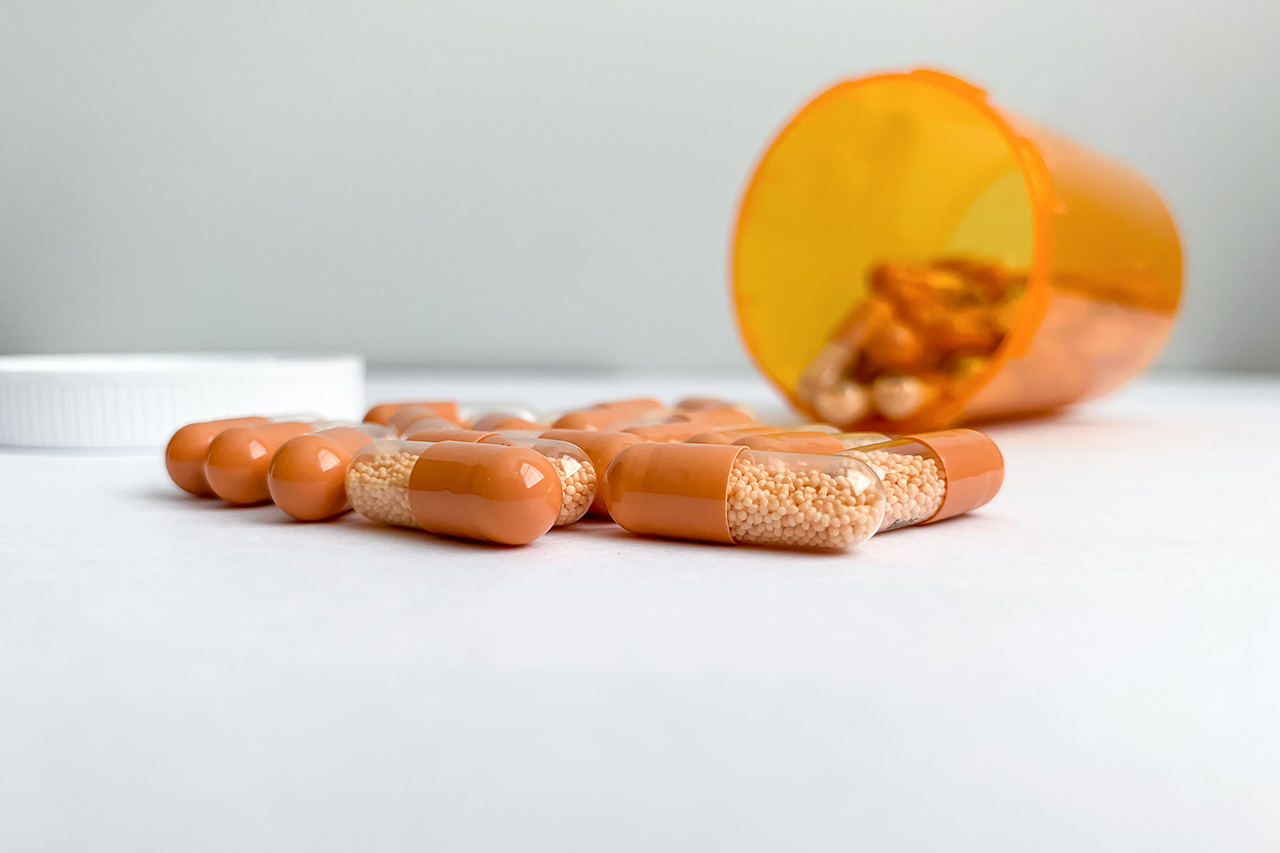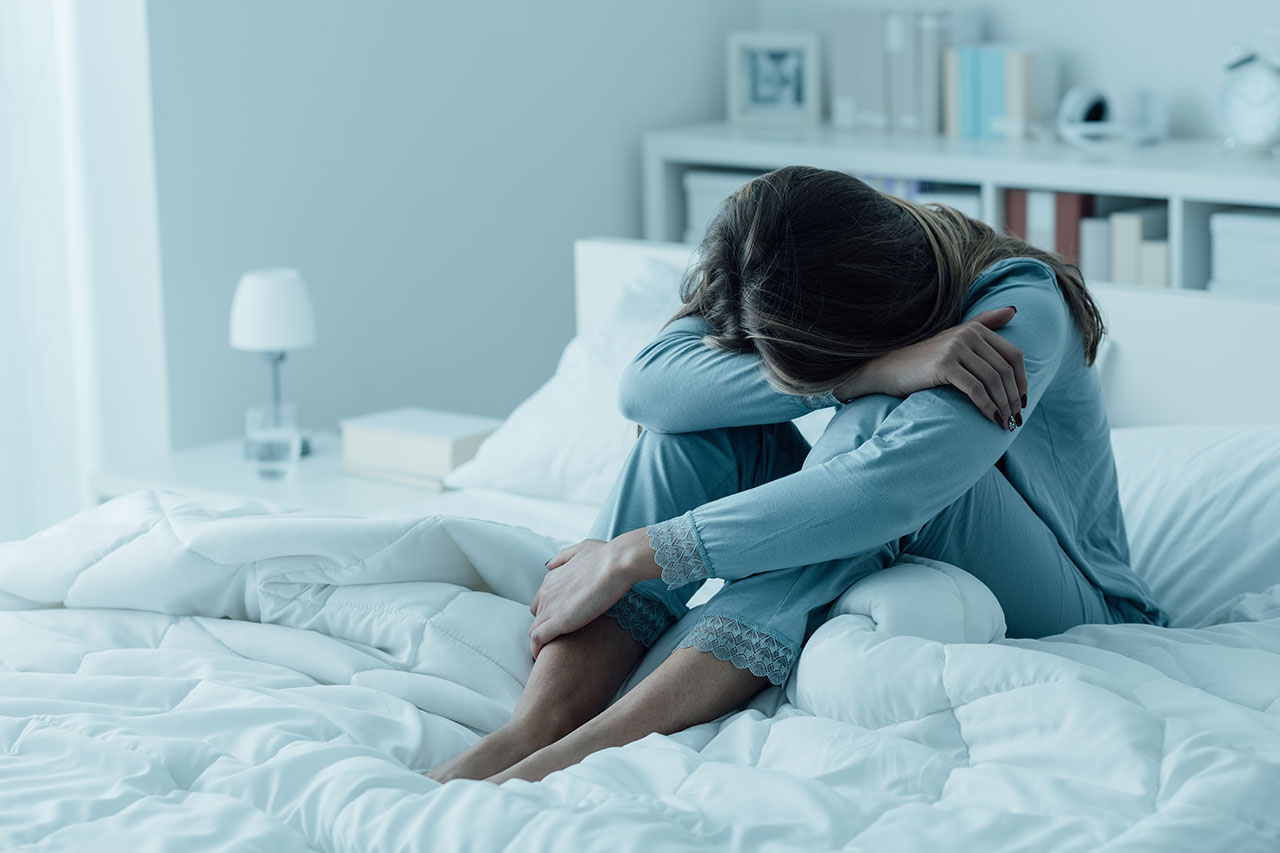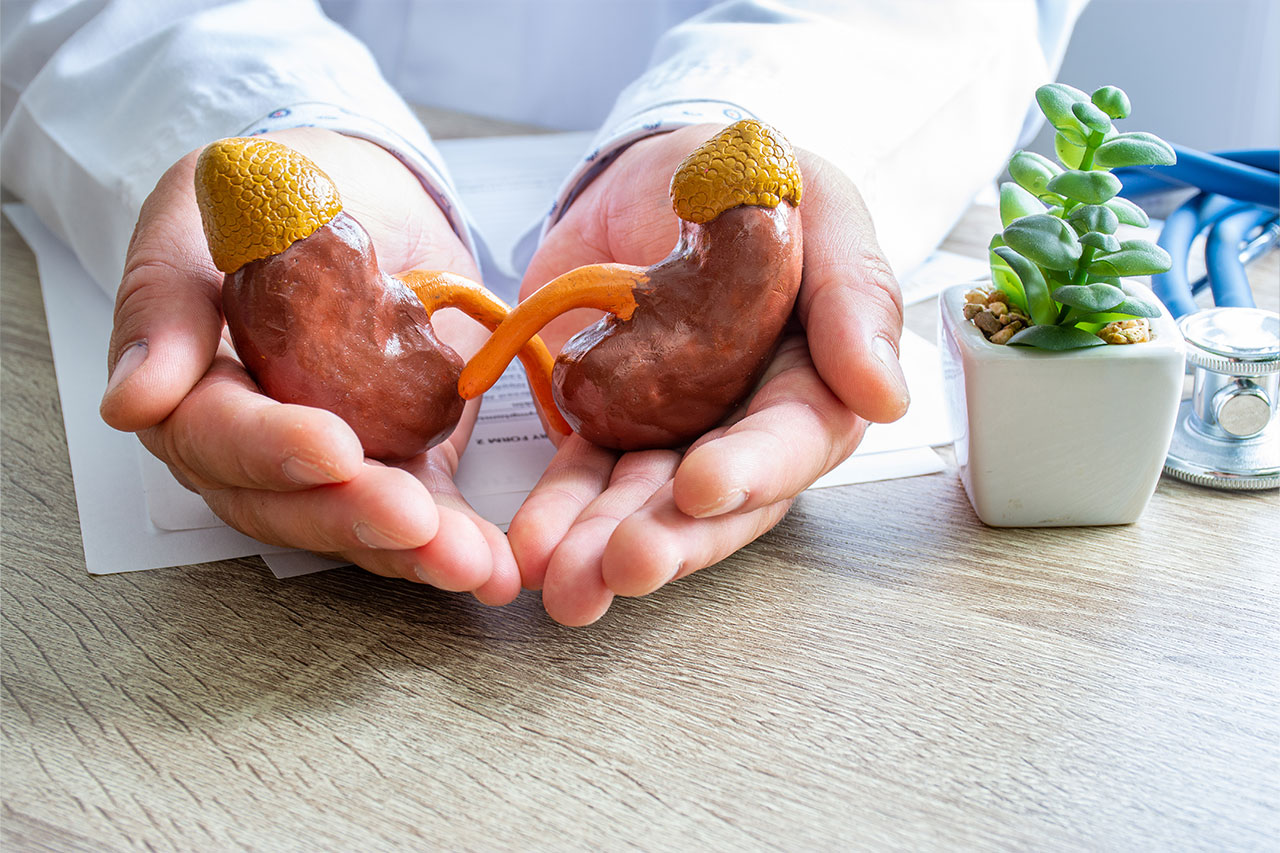
What You Should Know About Captagon
September 28, 2021
Does Adderall Cause Depression?
November 23, 2021
What You Should Know About Captagon
September 28, 2021
Does Adderall Cause Depression?
November 23, 2021
Long-Term Effects of Alcohol on the Kidneys
While plenty of us are familiar with alcohol’s effects on the liver, what about the long-term effects of alcohol on the kidneys? Moderate drinking here and there doesn’t do much harm, but people with more severe drinking habits may increase their risk of an addiction to alcohol and kidney disease, as well. Everyone who chooses to drink alcohol should be aware of the alcohol’s effects on the kidneys and why it’s worth it to stop while you’re ahead.
How Our Kidneys Work
To understand the long-term effects of alcohol on the kidneys, you have to know how they work. The kidneys are two bean-shaped organs – about the size of a fist – located just below the rib cage on either side of your spine. Healthy kidneys filter about half a cup of blood per minute, removing waste and excess water to create urine.
Your urine then flows from your kidneys to your bladder through two thin tubes of muscle called ureters, which are located on either side of your bladder. This is where your urine is stored. Along with your bladder and ureters, the kidneys make up your urinary tract.
What Are Their Roles?
The roles of the kidneys are to remove waste and excess fluid from your body, regulate your pH balance, and produce hormones. Your kidneys are also responsible for removing acid produced by cells and maintaining a good balance of water, salts, and minerals in your blood.
How Do They Work?
Each of your kidneys is made up of millions of nephrons or filtering units. Each nephron contains a glomerulus and a tubule. There are millions of glomerulus, collectively called glomeruli, on each kidney. The glomerulus filters your blood to remove smaller molecules, wastes, and fluids and send them through the tubule. The blood vessel that runs along the tubule then reabsorbs most of the water, minerals, and nutrients your body needs while removing excess acid from the blood. The remaining fluids are released in urine. Blood is also released from the renal artery, which is a large blood vessel that branches out into smaller ones until it reaches the nephrons in your kidneys. Once your blood is filtered through glomeruli, it flows into your kidney through the renal artery. Your kidneys filter about 150 quarts of blood per day, 1 or 2 of which become urine.
How Does Alcohol Affect the Kidneys?
As you’ve just read, the kidneys have important jobs as filters for harmful substances in our bodies. They filter out the bad stuff from our blood and allow us to flush everything out through urine. They also help regulate our blood pressure and even produce a hormone that plays a role in red blood cell production. But these necessary processes can be easily impacted by heavy alcohol consumption. Alcohol affects the kidneys by making them work harder to filter your blood, making them hold onto less liquid than normal, and spiking your blood pressure. Excessive or chronic drinking means that you’re constantly pushing the kidneys to work at their fullest, along with flushing your system with alcohol and toxins.
Dehydration
Alcohol is also a diuretic, which means that it suppresses a hormone that tells your kidneys to hold more water. As a result, more urine is passed, meaning more trips to the bathroom and an increased risk for severe dehydration and low electrolytes. Subsequently, you’ll end up feeling light-headed, dizzy, fatigued, and you may have a faster heart and breathing rate.
High Blood Pressure
Alcohol abuse can also lead to high blood pressure, which can have a direct impact on the kidneys, as well. High blood pressure constricts and narrows your blood vessels, eventually damaging and weakening them throughout your body, including the ones in your kidneys. This constriction reduces blood flow. If the blood vessels in your kidneys are damaged, their functions may be impaired, meaning that they won’t be able to filter your blood or remove all the wastes and extra fluids from your body. Having extra fluids in your blood vessels can further increase your blood pressure and further damage the kidney, creating a vicious cycle.
What are the causes of kidney pain after drinking?
Kidney pain after drinking can be caused by various factors related to alcohol consumption and kidney health. One of the primary reasons is dehydration, which is a common result of the diuretic effects of alcohol. Dehydration can lead to a decrease in fluid levels, affecting normal organ function and potentially causing kidney pain.
Another direct cause of kidney pain after drinking is acute kidney injury, which can occur in individuals who consume alcohol excessively and rapidly. This condition can manifest through symptoms like low urine output, swollen lower extremities, fatigue, breathing difficulties, and chest pain. In severe cases, acute kidney injury may even lead to convulsions or coma.
Other potential causes of kidney pain after drinking include hydronephrosis, a condition characterized by the swelling of the kidneys due to blockages or obstructions hindering proper urine drainage. Ureteropelvic junction obstruction is another condition that can lead to kidney pain after drinking, affecting kidney and bladder functionality. Additionally, kidney infections resulting from untreated urinary tract infections (UTIs) can lead to kidney pain after drinking. Symptoms of a kidney infection may include pain during urination, blood in the urine, and difficulties emptying the bladder. Alcohol consumption can also increase the risk of developing kidney stones due to dehydration, which can lead to kidney pain if the stones move quickly.
In conclusion, kidney pain after drinking can stem from various factors such as dehydration, acute kidney injury, hydronephrosis, ureteropelvic junction obstruction, kidney infections, and kidney stones, all of which can be exacerbated by alcohol consumption.
What are the short-term effects of alcohol on the kidneys?
"The full excerpt from Passage_1 that answers the question 'What are the signs and symptoms of alcohol-related kidney damage?' is as follows:
Short-term effects of alcohol on the kidneys manifest in various symptoms such as kidney pain, fatigue, fever, chills, vomiting, nausea, painful urination, blood in the urine, loss of appetite, trouble sleeping, and headaches. Additionally, alcohol consumption can lead to stomach upset, low blood sugar, and disrupted sleep. These effects can range from kidney pain to systemic disruptions associated with liquor, wine, or beer intake.
To further understand the severity of alcohol-related kidney damage, it's important to recognize a broader spectrum of symptoms that may indicate more serious kidney issues. According to a detailed study published in the National Library of Medicine, signs of severe kidney damage include:
- Decreased Urine Output: A noticeable decrease in urine production can be a telltale sign of impaired kidney function.
- Deterioration of Cognitive Function: Cognitive abilities may decline, impacting memory and concentration.
- Muscle Twitches, Cramps, and Swelling: Unexplained muscle twitches, cramps, and swelling in the feet or ankles can be associated with kidney problems.
- Itchiness: Persistent itchiness can be linked to kidney damage, especially without an apparent cause.
- Chest Pain: Unexplained chest pain should be evaluated, as it may be related to severe kidney issues.
- Shortness of Breath: Difficulty breathing or shortness of breath may be an alarming symptom of kidney damage.
- Hypertension Challenges: Struggles in controlling hypertension, or high blood pressure, can be connected to kidney dysfunction.
Recognizing these symptoms early can be crucial for prompt medical intervention and potentially mitigating further damage caused by alcohol consumption to the kidneys.
What Are the Long-Term Effects of Alcohol on the Kidneys?
While drinking may not cause immediate damage, you may notice some changes with continued and excessive drinking. The long-term effects of alcohol on the kidneys include:
- Kidney stones
- Kidney pain
- Kidney failure
- High blood pressure
- Dehydration
- Fluid retention
- Vasoconstriction (constriction of the blood vessels)
Experiencing kidney pain after drinking alcohol can also occur if you have liver disease, kidney infection, dehydration, ureteropelvic junction (UPJ) obstruction, hydronephrosis (swollen kidneys), or gastritis. Because alcohol targets organs of the body responsible for filtration – such as the kidneys and livers – it’s always safest to undergo a medically monitored detox for alcohol to clean out your system while receiving 24-hour care for withdrawals.
What Are The Different Tests Used To Detect Kidney Damage From Alcohol Consumption?
Detecting kidney damage resulting from alcohol consumption involves a series of specific tests that help assess kidney health. Here are the key tests commonly used:
1. Dipstick Test for Albumin This initial screening test involves a specially treated strip – a dipstick – that is dipped into a urine sample. The dipstick contains chemicals that react to the presence of albumin, a protein typically indicative of kidney damage when found in urine. If the protein levels are abnormal, the dipstick changes color. Although this test is quick, it is not definitive and cannot quantify the exact levels of albumin, necessitating further assessments.
2. Urine Albumin-to-Creatinine Ratio (UACR) For a more detailed analysis, the UACR test is conducted. This test measures the levels of albumin in the urine and compares it to the levels of creatinine, providing a ratio that quantifies how much protein is escaping into the urine. A UACR value of 30 or higher often points to potential kidney damage or disease, triggered by various factors including excessive alcohol intake. Depending on the results, additional tests may be required to confirm the diagnosis and assess the extent of kidney damage.
Both tests play a crucial role in the early detection and management of kidney health, especially for individuals with a history of significant alcohol use. By catching signs of damage early, healthcare providers can work to mitigate further harm and implement necessary treatment strategies.
How Can Proteinuria Be An Indicator of Kidney Dysfunction?
Proteinuria, the medical term for protein in urine, serves as an early warning sign of possible kidney issues. When kidneys function properly, they filter waste while keeping essential components like protein in the bloodstream. The presence of protein in urine suggests that the kidneys' filtering system might be damaged or malfunctioning.
Detecting Proteinuria: Key Tests
To confirm proteinuria and assess kidney health, healthcare providers commonly use the following diagnostic tests:
-
Dipstick Urine Test: This simple and initial testing method involves dipping a specially treated strip into a urine sample. If the strip indicates abnormal protein levels by changing color, it suggests proteinuria. However, as this test provides only qualitative data, further testing may be necessary for precise evaluation.
-
Albumin-to-Creatinine Ratio Test (UACR): This more detailed test compares the levels of albumin (a specific type of protein) to creatinine in urine. The result, expressed as a ratio, helps evaluate how much protein is being expelled from the body. A UACR value of 30 or higher might indicate kidney dysfunction, necessitating additional tests to establish a diagnosis and determine the underlying cause.
Importance of Early Detection
Identifying proteinuria early through these tests is crucial. It not only points to potential kidney damage but also allows for timely intervention to prevent further decline in kidney function. Regular screenings and monitoring are vital, especially for individuals at risk due to conditions like diabetes or hypertension, or those with a history of heavy alcohol use. Immediate medical consultation is advised if tests indicate abnormal protein levels to properly manage the condition and safeguard overall health.
Can Kidneys Recover From Alcohol Damage?
Can kidneys heal after being damaged by alcohol? The answer requires a closer look at how alcohol affects these vital organs.
Alcohol consumption, particularly at high levels, poses serious risks to kidney health. When you drink excessively, you increase your risk of developing proteinuria. This condition, characterized by high levels of protein in the urine, often signals the onset of chronic kidney disease.
Furthermore, for those already suffering from kidney issues, alcohol can worsen their condition, leading to more severe health complications over time. It’s crucial for anyone with kidney problems to consult their healthcare provider to understand the safe limits of alcohol consumption, if any, to prevent further damage or potential kidney failure.
Thus, while mild to moderate kidney damage might be mitigated by reducing alcohol intake and adopting healthier lifestyle habits, severe cases often have lasting effects. Early intervention and moderation are key to preventing irreversible damage and maintaining kidney health.
Can Alcohol Cause Kidney Stones
A kidney stone is a hard mass formed in the kidneys that are made up of minerals and acid salts that clump together in concentrated urine. Passing kidney stones is a notoriously painful process. Alcohol abuse can also contribute to kidney stones by causing dehydration. Alcohol affects the kidneys’ ability to maintain a healthy balance of water, minerals, and electrolytes in the body, impairing its ability to filter the urine, increasing your chances of developing a kidney stone.
What Treatment Options Are Available For Individuals With Kidney Problems Related To Alcohol Abuse?
Individuals experiencing kidney problems associated with alcohol abuse can access a range of treatment options to address their condition. Seeking professional help for treatment is highly recommended in such cases. Numerous facilities provide specialized rehabilitation services and comprehensive treatment programs that are customized to meet the specific needs of each individual seeking recovery. These programs aim to address both the underlying kidney issue and the alcohol abuse problem, offering a holistic approach to improve the individual's health and well-being. By focusing on both aspects simultaneously, these treatment options offer a chance for individuals to successfully overcome the challenges posed by kidney problems related to alcohol abuse.
How can alcohol-related kidney problems be prevented through diet and lifestyle changes?
To prevent alcohol-related kidney problems through diet and lifestyle changes, individuals can take several proactive steps. These include abstaining from alcohol altogether or reducing consumption, opting for lower alcohol content beverages like beer or wine, staying hydrated by drinking plenty of water, following a nutritious diet rich in fresh fruits and vegetables, and avoiding foods that contribute to kidney stone formation such as beets, french fries, nuts, spinach, dairy products, and beans. It is also recommended to reduce salt, sugar, and caffeine intake, ensure an adequate intake of calcium, engage in regular physical activity, and seek professional help if struggling to control alcohol cravings. Taking these steps can help mitigate the risks associated with alcohol abuse and protect kidney health.
How is alcohol related to kidney disease?
Alcohol consumption can have a significant impact on kidney health. While the liver primarily processes alcohol, the kidneys also play a crucial role in filtering alcohol byproducts and eliminating them from the body through urine. In moderation, occasional alcohol consumption may not directly lead to kidney issues in a healthy individual. However, excessive and prolonged alcohol intake can put a strain on the kidneys and increase the risk of developing kidney diseases.
Over time, chronic alcohol abuse can lead to conditions such as alcoholic nephropathy, which is characterized by structural and functional kidney damage. The toxic effects of alcohol on the kidneys can interfere with their ability to effectively filter waste products from the blood, leading to the accumulation of toxins and potential kidney dysfunction. As this condition progresses, several key symptoms may become apparent. These include nausea, vomiting, and a loss of appetite, which are often the initial signs of kidney distress. Additionally, individuals may experience fatigue, weakness, and sleep disturbances, further indicating the severity of kidney damage.
Other notable symptoms include decreased urine output, a clear indicator of the kidneys' failing efficiency. Cognitive functions may also deteriorate, accompanied by muscle twitches, cramps, and swelling, signaling disrupted electrolyte balance. Skin issues such as itchiness and even chest pain or shortness of breath can occur as fluid balance is impaired. Finally, patients might face challenges with hypertension, a direct consequence of compromised kidney function.
Understanding these symptoms is crucial for early detection and management of kidney damage due to alcohol abuse, potentially preventing further health complications.
Furthermore, alcohol consumption can contribute to high blood pressure and lead to dehydration, both of which are risk factors for kidney disease. Excessive drinking can also exacerbate existing kidney conditions or impair the effectiveness of treatments for kidney problems.
To mitigate the risks of alcohol-related kidney damage, it is essential to consume alcohol in moderation and stay well-hydrated. Seeking medical advice and regular monitoring of kidney function are crucial for individuals who consume alcohol regularly or in large quantities to ensure early detection and management of any potential kidney issues.
Bottom Line
Not only is alcohol bad for your kidneys, but it’s also damaging to your liver, heart, brain, and other vital organs of the body. Alcohol is an addictive central nervous system depressant that, when consumed in high doses, produces sedation and a sense of well-being (a buzz). Therefore, chronic and heavy drinking can result in alcoholism or alcohol addiction, which can have an impact on your health, finances, career, and relationships.
If you or someone close is struggling with a drinking problem, don’t wait to get help. Faith in Recovery offers comprehensive faith-based recovery programs that focus on the physical, mental, and spiritual aspects of addiction recovery.
To learn how we can help you overcome addiction today, call our Christian recovery center at 888-280-4763 to learn more about our residential addiction treatment.
Related Reading:
Giving Up Alcohol for Lent & Why You Should Make It Permanent
The Connection Between Alcohol and Dementia
Source:
- NIDDK - Your Kidneys & How They Work

